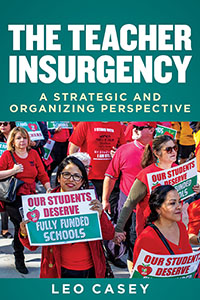Wednesday | December 9, 2020

In The Teacher Insurgency, Leo Casey addresses how the unexpected wave of recent teacher strikes has had a dramatic impact on American public education, teacher unions, and the larger labor movement. Casey explains how this uprising was not only born out of opposition to government policies that underfunded public schools and deprofessionalized teaching, but was also rooted in deep-seated changes in the economic climate, social movements, and, most importantly, educational politics.
With an eye to maintaining the momentum of the insurgency, the author examines four key strategic questions that have arisen from the strikes: the relationship of mobilization to organizing; the relationship between protests and direct action; the conditions under which teacher strikes are most likely to be successful; and the importance of “bargaining for the common good.” More broadly, Casey examines how to organize teachers for collective action, focusing on four discourses of teaching: teaching as nurturance; as professionalism; as labor and craft; and as a vocation of democratic intellectual work.
Casey’s analysis is located within a larger examination of organizing teachers for collective action. He draws upon social science and historical literature in addressing these questions and examines this wave of activism not just as a phenomenon of labor, but in the context of the broader universe of social movements.
Leo Casey is the executive director of the Albert Shanker Institute, a former public high school teacher, and past vice president of New York City’s United Federation of Teachers.
Randi Weingarten is President of the American Federation of Teachers and the Albert Shanker Institute.
Order the book from Harvard Education Press and save 20% when you use the promo code Ti2020 (offer expires March 24, 2021.)
Teacher Insurgency can also be ordered on Amazon.
